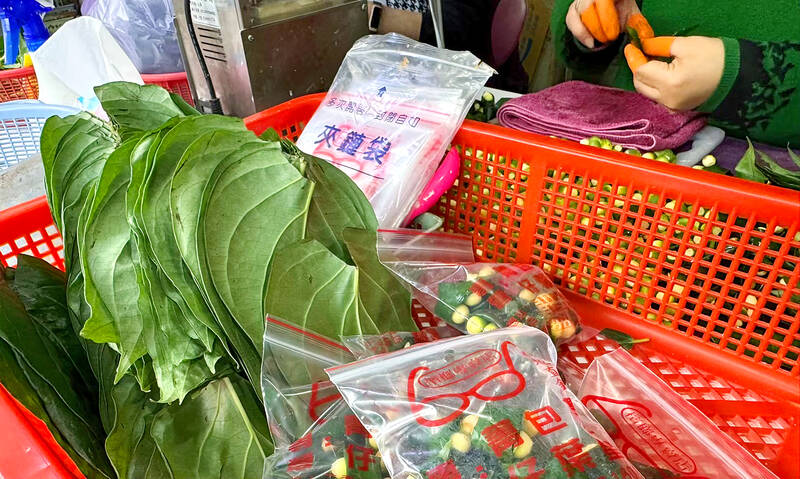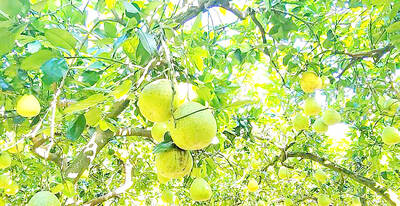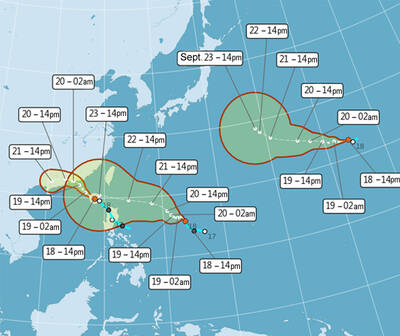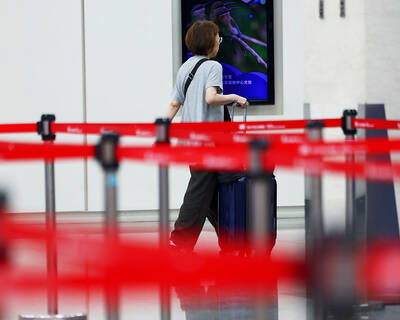A draft act to regulate the use and sale of betel nuts would be put on hold, the Ministry of Health and Welfare said yesterday amid strong resistance from the nation’s betel nut industry.
The draft would have included a list of venues where chewing betel nut is prohibited, required dealers to get a license, and banned pregnant women and minors from using the stimulant.
The bill’s 60-day preview period ended yesterday.

Photo: Chiu Chih-jou, Taipei Times
Officials received more than 4,500 written opinions demanding that implementation of the law be postponed, the ministry said in a statement.
Local groups have long argued for tighter regulations for betel nuts, also known as areca nuts, a product the International Agency for Research on Cancer classifies as a Category 1 carcinogen.
The draft would have prohibited betel nut chewing at schools, social welfare facilities, cultural and educational venues, government offices and on public transportation, a preview of its provisions published in December last year showed.
Chewing the stimulant in a betel nut-free zone would be punishable by a fine of NT$2,000 to NT$10,000, it said.
Wholesalers and retailers of betel nut operating without a license would face a fine of NT$10,000 to NT$50,000, it said.
The ministry received 4,423 written responses from the public and more than 100 statements from local government offices, mostly arguing that the act’s promulgation should be delayed, Department of Oral Health Director-General Chang Yung-ming (張雍敏) was cited as saying.
The proposal to ban betel nut chewing in some locations and a licensing scheme for dealers elicited the most opposition, Chang said, adding that others expressed concerns about safety certification standards.
The ministry plans to rewrite the law after new rounds of discussions with health experts and the industry to ensure their concerns are addressed, he said.
The government’s responsibility for transparency and taking public opinion into account in making laws means that the ministry has no fixed schedule for unveiling a revised version of the act, he said.

NEW AGREEMENT: Malaysia approved imports last year after nearly two years of negotiations and inspections to meet quarantine requirements, officials said Up to 3.6 tonnes of pomeloes from Taiwan cleared Malaysian customs on Friday, in the first shipment of Taiwanese pomeloes to Malaysia. Taiwan-grown pomeloes are popular in domestic and overseas markets for their tender and juicy taste, the Ministry of Agriculture’s Animal and Plant Health Inspection Agency said. The fruit is already exported to Japan, Canada, Hong Kong, Singapore and the Philippines, it added. The agency began applying for access to the Malaysian market in 2023, compiling data on climate suitability, pests and diseases, and post-harvest handling, while also engaging in nearly two years of negotiations with Malaysian authorities and submitting supplementary

PEAK MONTHS: Data showed that on average 25 to 27 typhoons formed in the Pacific and South China seas annually, with about four forming per month in July and October One of three tropical depressions in the Pacific strengthened into a typhoon yesterday afternoon, while two others are expected to become typhoons by today, Central Weather Administration (CWA) forecaster Lee Ming-hsiang (李名翔) said yesterday. The outer circulation of Tropical Depression No. 20, now Typhoon Mitag, has brought light rain to Hualien, Taitung and areas in the south, Lee said, adding that as of 2pm yesterday, Mitag was moving west-northwest at 16kph, but is not expected to directly affect Taiwan. It was possible that Tropical Depression No. 21 would become a typhoon as soon as last night, he said. It was moving in a

Tigerair Taiwan and China Airlines (CAL) today announced that several international flights were canceled or rescheduled due to Typhoon Ragasa. The Central Weather Administration (CWA) has maintained sea and land warnings for the typhoon. Its storm circle reached the Hengchun Peninsula (恆春半島) on Taiwan's southern tip at 11am today. Tigerair Taiwan said it canceled Monday's IT551/IT552 Taoyuan-Da Nang, IT606/IT607 Taoyuan-Busan and IT602 Taoyuan-Seoul Incheon flights. Tomorrow, cancelations include IT603 Seoul Incheon-Taoyuan, as well as flights between Taoyuan and Sapporo, Osaka, Tokyo Narita, Okinawa, Fukuoka, Saga, Tokyo Haneda, Nagoya, Asahikawa and Jeju. On Wednesday, the IT321/IT322 Kaohsiung-Macau round-trip would also be canceled. CAL announced that today's

About nine Taiwanese are “disappeared,” detained, or otherwise deprived of freedom of movement in China each month, the Mainland Affairs Council (MAC) said yesterday. Between Jan. 1 last year and Aug. 31 this year, 188 Taiwanese travelers went missing, were detained and interrogated, or had their personal freedom restricted, with some questioned in airports or hotel lobbies, the council said. In a statement ahead of the Mid-Autumn Festival, the council urged people visiting China for any reason to be highly vigilant and aware of the risks. Of the reported cases, 50 people were “disappeared” after entering China, 19 were detained and 119 had